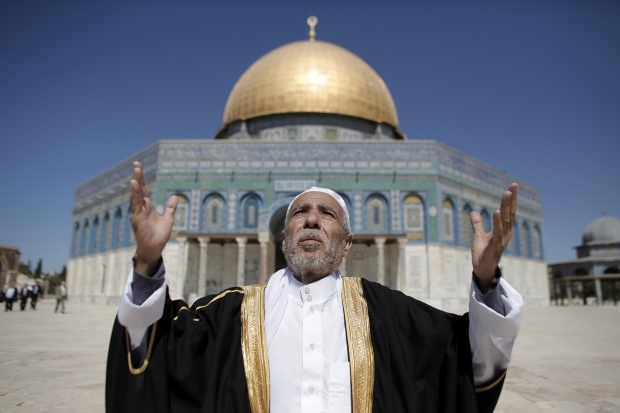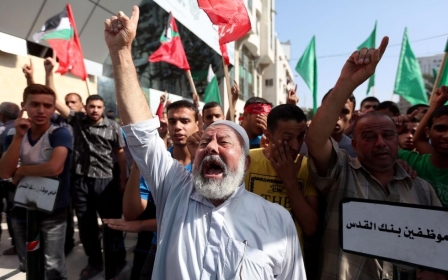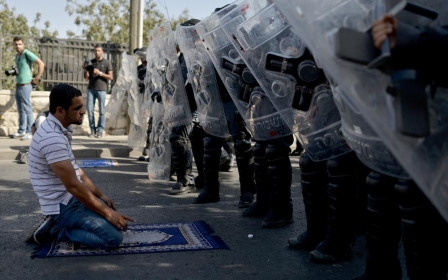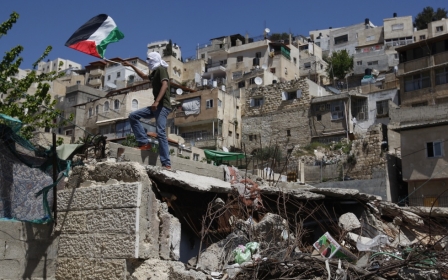Israel risks turning al-Aqsa into powder keg

With East Jerusalem already smouldering, it emerged this week that the Israeli parliament is to consider a bill that could set the region ablaze. The measure would lift limitations on Jews visiting the al-Aqsa mosque compound, the most sensitive site in the Israeli-Palestinian conflict.
Details of the measure have yet to be published. But one possibility is that it will overturn a prohibition in Israeli law on Jews praying at the site, ending also a rabbinical injunction against such activities.
Other reports, however, suggested it would extend visiting times for Jews, possibly by forcing the Islamic authorities to divide the site and create a dedicated area for Jewish visitors.
For several weeks clashes have been raging at the site, known as the Haram al-Sharif, or Noble Sanctuary to Muslims and Temple Mount for Jews. If passed, the legislation would likely trigger a much-anticipated third Palestinian intifada, or uprising, and set off protests across the Muslim world.
The bill that apparently has the backing of the Eli Ben Dahan - Israeli politican, Rabbi and the deputy religious services minister - would create arrangements similar to those already in place in Hebron where there are security procedures and restrictions on times of worship.
The Ibrahimi mosque in Hebron has been split in two, with the Jewish half - the Tomb of the Patriarchs - becoming a major attraction for Israelis. Jewish settlers have also created a series of enclaves protected by the Israeli army in and around the Palestinian city.
Settlers pose as tourists
Although Israel describes the Jews who visit the Haram al-Sharif simply as “tourists”, most are extremist settlers, including many who wish to destroy al-Aqsa and replace it with a Jewish temple.
They have been visiting in ever larger numbers. During the week-long Jewish holiday of Sukkot this month, hundreds of such Jewish “tourists” were escorted by armed police on to the esplanade, triggering a furious response from Muslim worshippers.
Jordan, which is officially responsible for the site, protested to Israel this week. The Jordanian ambassador to Palestine, Khalid al-Shawabka, told Maan TV that "the al-Aqsa mosque and Jerusalem are red lines”.
The Fatah movement of the Palestinian president, Mahmoud Abbas, sounded the alarm too. Its Revolutionary Council issued a statement that any move to divide the mosque “is invalid under international law and is a step that will blow up the whole region”.
Apparently fearful of the wider repercussions, the United Nations secretary-general, Ban Ki-moon, was uncharacteristically outspoken during his visit to the region last week. “I am deeply concerned by repeated provocations at the holy sites in Jerusalem,” he said. “These only inflame tensions and must stop.”
Officials for the Israeli prime minister, Benjamin Netanyahu, tried to placate Jordan, saying Jews would not be allowed to pray at the site, and there was “no intention of changing the status quo”.
Although Netanyahu is probably too wary to light the powder keg that is al-Aqsa by allowing the measure to pass, claims that Israel has not changed the status quo at al-Aqsa are far off the mark.
Erosion of status quo
Over the past few weeks al-Aqsa has been the scene of repeated clashes between Israeli police and Palestinians incensed by Israel’s continuing erosion of arrangements that are supposed to leave Islamic clerics, known as the Waqf, in charge.
Netanyahu’s repeated claims that Israel guarantees freedom of worship for all faiths in Jerusalem are misleading.
During this month’s lengthy high Jewish holidays, Israel intensified already severe restrictions on Muslim prayer at al-Aqsa, apparently to accommodate demands from Jewish extremists for greater access to the site.
Since the signing of the Oslo accords two decades ago, Muslim worshippers have faced ever-tighter limitations on their freedoms at the compound.
Israel, which treats East Jerusalem as an integral part of its territory, has refused the great majority of Palestinians - those in the West Bank and Gaza - the right to visit and pray at al-Aqsa. Israel has further limited prayer rights by imposing a minimum age for Muslim men, including those in Jerusalem and Israel.
During the recent holidays, Israel barred Muslim men under the age of 50 from entering al-Aqsa. Meanwhile, hundreds of “tourists” - many of them closely allied to settler groups wanting to destroy the al-Aqsa mosque - were escorted by armed police on to the esplanade.
The ensuing clashes led Israel’s police minister, Yitzhak Aharonovich, to temporarily close the site to non-Muslims. However, Aharonovich indicated that he was considering further changes to the status quo: “I am examining the possibility that if the mount is closed to Jews it will be closed to Muslims too.”
Such closures might provide useful leverage for Israel, which could tie a reopening of the site to an agreement from the Waqf to provide better terms for Jewish visits.
Jewish enclaves
But the encroachments on al-Aqsa are not limited to the growing presence in the compound of Jewish extremists who want either to split the al-Aqsa site or to destroy the mosque.
Israel has also been extensively altering the geography around the esplanade, including by helping settler groups create enclaves in Palestinian communities close to the al-Aqsa esplanade, as a way to encircle the site.
The focus of such activities has been Silwan, which is just outside the Old City walls and only a stone’s throw from the mosque itself.
For the past two decades Silwan has been home to a settler-run archaeological theme park called the City of David, supported by the Israeli authorities. Attracting hundreds of thousands of Jewish visitors each year, the park claims to prove that the area right next to al-Aqsa was the capital of the Biblical King David.
But it has also given the settlers a foothold from which they are slowly taking over ever more of the Palestinian neighbourhood.
Tensions in Silwan heightened dramatically this month as dozens of settlers moved under cover of night into Palestinian homes, doubling their presence in the neighbourhood almost overnight. Their armed compounds have won Netanyahu’s blessing.
Local residents have responded with predictable outrage. In recent days there has been an almost constant stream of reports of stone-throwing and fire-bomb attacks on settlers’ cars and homes. The violence has spread to many other neighbourhoods being infiltrated by settlers.
The Palestinian driver who careered into passengers disembarking from the city’s light rail system on Wednesday night - in an incident being treated by Israel as a ‘terror attack’ - was a 20-year-old resident of Silwan.
Unifying symbol
Palestinians have strong grounds for fearing that all this activity is designed to gain greater control over the al-Aqsa compound.
Since East Jerusalem was occupied in 1967, Israeli politicians and religious leaders have viewed the site as a powerful symbol, one capable of unifying religious and secular Israelis. The esplanade, adjacent to the Western Wall, is assumed to stand over two Jewish temples, the last one destroyed nearly 2,000 years ago. For this reason, Israelis refer to the site as the Temple Mount.
Israel has been trying to whittle away the Waqf’s control for decades. In all peace talks since Camp David in 2000, Israel has demanded that it be given a much greater say in affairs at the site.
It was a visit in 2000 to the esplanade by Ariel Sharon, then Israel’s opposition leader, that triggered the second intifada. Backed by 1,000 armed guards, he went to the site with the express intention of demonstrating Israeli sovereignty.
As East Jerusalem teetered on the brink of intensified clashes this week, Netanyahu went on the attack. Vowing to “restore quiet and security” in the city, he accused Abbas of inciting the violence and aiding terrorism.
“We are encountering weakness from the international community against these actions from the Palestinian Authority president,” said Netanyahu. “They are not willing to say two words, or even one word of criticism against him.”
Netanyahu’s accusation echoed that against Abbas’ predecessor, Yasser Arafat, 14 years ago, when Israel blamed him for engineering the outbreak of the second intifada.
PA role eradicated
Then as now, the claims are grounded in little more than fantasy.
As Israeli intelligence experts conceded later, Arafat had no control over the outpouring of Palestinian anger that swept across the occupied territories in 2000, in the wake of the failed Camp David peace talks. Instead he did his best to ride the popular wave of fury.
Abbas is even further removed from the action than Arafat, and can do little more than watch events unfold in East Jerusalem from the sidelines. In fact, it is his very impotence in Jerusalem that is fuelling much of the current tension.
At Israel’s insistence, Mahmoud Abbas and his Palestinian Authority, the supposed Palestinian government in waiting, have had no discernible presence in Jerusalem for years.
Since the second intifada erupted in late 2000, Israel has worked strenuously to eradicate any role for the PA in the lives of East Jerusalem’s residents.
The extent of that success was highlighted this month when Israeli police broke up a meeting attended by foreign diplomats at which PLO representatives were - paradoxically - to have explained how Israel had shut down all Palestinian institutions in Jerusalem.
The Israeli government’s stance has backing from the Israeli public. A poll this week showed three-quarters of Israeli Jews were opposed to a Palestinian state if it meant conceding control over East Jerusalem.
Empty words
But the absence of a Palestinian leadership has fed a growing sense among East Jerusalem residents of their isolation and vulnerability.
With Jerusalem now effectively severed from the rest of the West Bank by walls and checkpoints, its residents are slowly being stripped of their place at the heart of a future Palestinian state. And as a result, the potential threats to the al-Aqsa mosque seem to them only magnified.
Tough talk by Abbas over the past week has only underscored to them his powerlessness.
At a press conference in Ramallah last Saturday, he urged Palestinians to use “any means” to stop what he described as a “fierce onslaught” by Jewish extremists trying to gain greater access to the al-Aqsa compound.
A short time later Abbas announced he had changed the penalty for Palestinian collaborators who sell properties to settlers, such as has occurred in Silwan. They will now face imprisonment with “hard labour for life”. His Fatah party also declared such acts “high treason”.
But the truth is that Abbas’ words are empty. He has no ability to enforce Palestinian law on collaborators in Jerusalem, which is why they have become such a problem. And his call on ordinary Palestinians to protect al-Aqsa simply highlights the fact that his security forces are in no position to do so.
Middle East Eye propose une couverture et une analyse indépendantes et incomparables du Moyen-Orient, de l’Afrique du Nord et d’autres régions du monde. Pour en savoir plus sur la reprise de ce contenu et les frais qui s’appliquent, veuillez remplir ce formulaire [en anglais]. Pour en savoir plus sur MEE, cliquez ici [en anglais].




